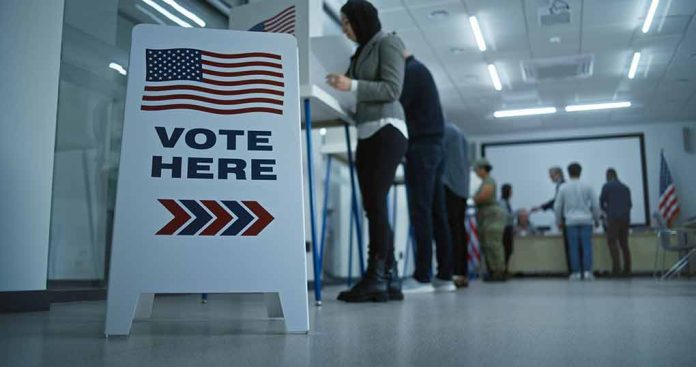
Controversy arises as the U.S. Supreme Court applies the Purcell Principle in a recent case about restrictive voting laws in Arizona.
At a Glance
- The Purcell principle advises against changing election rules shortly before an election to avoid voter confusion and administrative issues.
- The Supreme Court’s controversial 5-4 vote allows Arizona to enforce a law requiring proof of citizenship for voter registration using a state form.
- The ruling has raised concerns about voter disenfranchisement and administrative challenges.
- Dissenting opinions suggest the Purcell Principle was misapplied to uphold restrictive voting laws.
Implications of the Purcell Principle
The Purcell Principle, named after the Supreme Court case Purcell v. Gonzalez, advises against making changes to election rules close to an election. This principle aims to prevent voter confusion and administrative complications. The concept arose from a 2006 decision where the court reversed a 9th Circuit ruling blocking an Arizona voter ID law before the midterm election.
Courts consider four factors when reviewing such motions: likelihood of success on appeal, irreparable harm to the party seeking the stay, harm to other parties, and public interest. The principle has been referenced in multiple cases, including Veasey v. Perry in 2014 and the Republican National Committee v. Democratic National Committee in 2020.
In Veasey v. Perry, the Supreme Court allowed a Texas voter ID law to remain effective despite a district court ruling it unconstitutional. This was based on the potential logistical challenges. Similarly, during the COVID-19 pandemic in 2020, the Supreme Court blocked a district court ruling extending absentee ballot deadlines in Wisconsin, citing the Purcell Principle.
Professor @rickhasen on the Arizona mess: “Purcell is just an excuse by some of the more conservative Justices to shape election law in the direction they like: blocking last-minute changes that help voters but green-lighting those that hurt them.” https://t.co/hYMjmh45A0
— Eric Segall (@espinsegall) August 23, 2024
The Arizona Case
The Supreme Court’s recent decision allows Arizona to enforce a law requiring proof of citizenship for voter registration using a state form, while not reinstating the provision barring those using a federal form from voting without proof of citizenship. Arizona’s H.B. 2492, enacted in 2022, attempts to verify citizenship for federal form registration, conflicting with the National Voter Registration Act (NVRA), which requires states to accept a federal form without proof of citizenship.
“The problem of non-citizen voting has gotten worse, as the number of aliens in the United States has undeniably grown,” petitioners in the case have alleged.
The decision was made with a 5-4 vote. Conservative justices Thomas, Alito, and Gorsuch would have fully reinstated the law. Meanwhile, Justices Sotomayor, Kagan, Barrett, and Jackson opposed the request entirely. Chief Justice Roberts and Justice Kavanaugh did not publicly indicate their votes but were crucial for the partial reinstatement.
Justices allow Arizona to enforce proof-of-citizenship law for 2024 voter registration
24A164 REPUBLICAN NAT. COMM., ET AL. V. MI FAMILIA VOTA, ET AL.https://t.co/bbPDZaf0xR
By Amy Howe
Aug 22, 2024 at 4:23 pmhttps://t.co/ihPO23adqUA divided Supreme Court on Thursday… pic.twitter.com/eEp5EwEFKW
— SubX.News (@SubxNews) August 23, 2024
Debate on the Ruling
Critics argue that upholding restrictive voting laws close to an election led to disruptions in established processes and potential voter disenfranchisement. Justice Ginsburg and others have voiced dissenting opinions, arguing that the Purcell Principle was misapplied and changes would not significantly cause voter confusion. Arizona’s Attorney General Kris Mayes and the Democratic National Committee stated that reinstating the law would destabilize the election process. Further, the Biden administration opposed the decision, citing a 2013 Supreme Court ruling preventing states from requiring additional information beyond that required on the federal form.
Arizona Republican leaders requested the decision by August 22 to print ballots in time for the upcoming election. The case underscores the ongoing debate about balancing electoral integrity with the necessity for accessible voting.
Sources
- https://www.cnn.com/2024/08/27/politics/supreme-court-election-purcell-principle/index.html
- https://www.scotusblog.com/election-law-explainers/the-purcell-principle-a-presumption-against-last-minute-changes-to-election-procedures/
- https://www.scotusblog.com/2024/08/justices-allow-arizona-to-enforce-proof-of-citizenship-law-for-2024-voter-registration/
- https://electionlawblog.org/%3Fp%3D145326
- https://www.theatlantic.com/politics/archive/2024/08/supreme-court-arizona-proof-of-citizenship-voting-rights/679542/
- https://reason.com/volokh/2024/08/26/did-supreme-court-violate-the-purcell-principle-in-arizona-voting-case/
- https://www.msnbc.com/deadline-white-house/deadline-legal-blog/republicans-supreme-court-arizona-voter-registration-law-rcna166267
- https://ir.law.fsu.edu/cgi/viewcontent.cgi%3Farticle%3D2542%26context%3Dlr
- https://dc.law.utah.edu/cgi/viewcontent.cgi%3Farticle%3D1339%26context%3Dulr
- https://scholarship.law.duke.edu/cgi/viewcontent.cgi%3Farticle%3D4113%26context%3Ddlj










